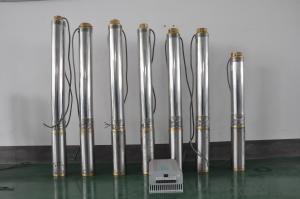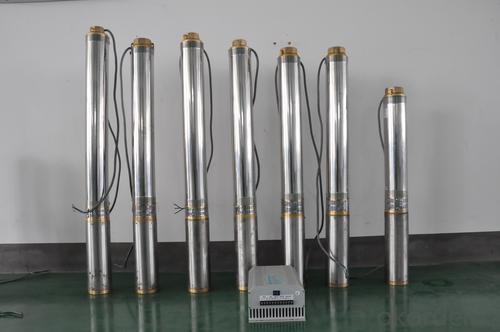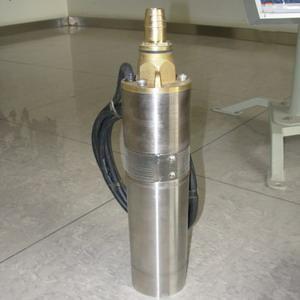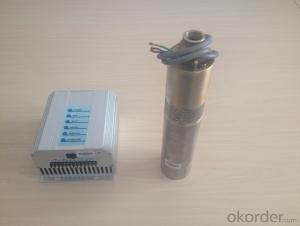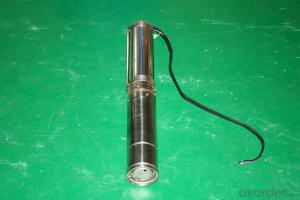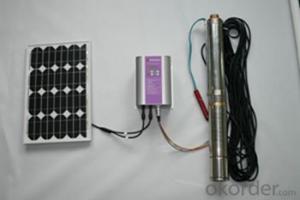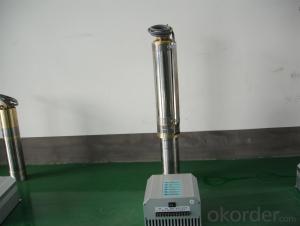Solar Pump Kit - Submersible Solar Water Pump
- Loading Port:
- China Main Port
- Payment Terms:
- TT OR LC
- Min Order Qty:
- -
- Supply Capability:
- -
OKorder Service Pledge
OKorder Financial Service
You Might Also Like
Item Description :
This superb new addition to our solar fountain range comes with a 10w solar panel,and a powerful fountain pump that is capable of producing fountains of up to 2m in height. As well as being easy to set up and use.Instruction manual is supplied for assembly and maintenance.
Solar Fountain Key Features :
Powered by direct sunlight
No high voltage electric mains required
Safe for children
Max. height of fountain: 2M
Max. flow capacity: 800 L/H(176 GAL)
10W Polycrystalline solar panel included
18V DC brushless pump
Solar Pump Features :
Can produce fountains up to : 2M (tube height) 1.4M (fountain height)
Comes with multiple nozzle accessories
Cable Length : 5M
Solar Panel Features :
10W peak power.
Polycrystalline highly efficient solar panel
Comes mounted in aluminium frame
Comes with ground stake and rotating knob so you can angle your panel toward the sun
What You Will Get :
10W solar panel
Solar pump
Ground Sake
Nozzle accessories
Precautions :
DO NOT alter or change the product itself or its components
Operate pump in freshwater only, never above 50 degrees celsius
Keep away from flammable liquids
Do not connect to any other power supply other than the included
- Q: Are there any limitations to the size of particles a solar pump can handle?
- Yes, there are limitations to the size of particles a solar pump can handle. Solar pumps typically have a filtration system to prevent large particles from entering the pump and causing damage. However, the specific limitations vary depending on the design and capacity of the pump. It is important to check the manufacturer's specifications and recommendations to ensure that the pump can handle the size of particles present in the water source.
- Q: Can solar pumps be used for geothermal heating or cooling systems?
- No, solar pumps are not typically used for geothermal heating or cooling systems. Geothermal systems rely on the natural heat stored in the ground, while solar pumps are designed to utilize solar energy for pumping water or other fluids. Geothermal systems typically involve specialized equipment and technologies specifically designed for geothermal applications.
- Q: Can a solar pump be used in areas with limited access to electricity for backup systems?
- Yes, a solar pump can be used in areas with limited access to electricity for backup systems. Solar pumps rely on solar energy to operate, making them ideal for remote areas without reliable electricity supply. They can provide a sustainable and cost-effective solution for water pumping needs in such areas, ensuring access to water even during power outages or when grid electricity is unavailable.
- Q: How do solar pumps handle water with high bacterial or microbial content?
- Solar pumps do not directly handle or treat water with high bacterial or microbial content. They are primarily designed to pump water from a source, such as a well or a reservoir, and transfer it to a desired location. However, if the water being pumped has high bacterial or microbial content, additional treatment methods such as filtration, chlorination, or ultraviolet disinfection may be required to ensure safe and potable water for consumption or other uses.
- Q: Can a solar pump be used for water supply in a remote cabin?
- Yes, a solar pump can be used for water supply in a remote cabin. Solar pumps are designed to operate using solar energy, making them an ideal choice for off-grid locations like remote cabins. They can effectively pump and deliver water from a well, river, or other water sources, providing a reliable and sustainable water supply for the cabin.
- Q: Are there any restrictions on the use of solar pumps in certain regions or countries?
- Yes, there can be restrictions on the use of solar pumps in certain regions or countries. These restrictions can vary depending on factors such as local regulations, environmental concerns, availability of sunlight, and government policies. Some regions or countries may have specific rules regarding the installation, operation, or maintenance of solar pumps, while others may require permits or certifications before their use. Additionally, in areas with limited access to sunlight or where alternative energy sources are prioritized, the use of solar pumps may be less common or restricted. It is essential to research and understand the specific regulations and requirements of a particular region or country before installing or using solar pumps.
- Q: Are solar pumps maintenance-free?
- Solar pumps are not completely maintenance-free. While they require less maintenance compared to traditional pumps, regular checks and maintenance are still necessary to ensure optimal performance. This can include cleaning the solar panels, checking the connections, and monitoring the pump's functionality.
- Q: What is the maximum depth that a solar pump can draw water from?
- The depth that a solar pump can draw water from varies depending on several factors, including the pump type and efficiency, the power of the solar panels, the size of the water source, and the distance between the pump and the water source. On average, most solar pumps have a maximum suction lift of approximately 20 to 30 feet (6 to 9 meters). However, there are advanced solar pumps available with more powerful panels and higher efficiency that can achieve a maximum suction lift of 100 feet (30 meters) or more. To determine the maximum depth that a specific solar pump can draw water from, it is crucial to consider these factors and consult the manufacturer's specifications.
- Q: How does the programming and control system of a solar pump work?
- The programming and control system of a solar pump works by utilizing various components and technologies to ensure efficient and reliable operation. Firstly, the system consists of solar panels that convert sunlight into electrical energy. These panels are usually installed in a location with maximum exposure to sunlight to ensure optimal energy generation. The solar panels are connected to a charge controller, which regulates the voltage and current from the panels to prevent overcharging of the batteries. The control system also includes batteries, which store the generated electrical energy for later use when sunlight is not available, such as during the night or on cloudy days. The batteries are connected to an inverter, which converts the stored DC (direct current) power into AC (alternating current) power, suitable for driving the pump motor. The programming aspect of the system involves setting up timers and sensors to control the pump's operation. For instance, a timer can be programmed to activate the pump during specific times of the day when sunlight is abundant. This ensures that the pump operates when there is sufficient solar energy available. In addition, sensors can be integrated into the system to monitor water levels, pressure, or other relevant parameters. These sensors can provide feedback to the control system, allowing it to adjust the pump's speed or halt operation if certain thresholds are exceeded. This helps in preventing over-pumping or damage to the system. Furthermore, the programming and control system may also incorporate features such as remote monitoring and control. This allows users to monitor the pump's performance, receive alerts on any issues, and adjust settings remotely using a smartphone or computer. Such features enhance convenience and enable proactive maintenance. Overall, the programming and control system of a solar pump combines the power generation capabilities of solar panels, the energy storage capacity of batteries, and intelligent programming to optimize the pump's operation. This results in an efficient, sustainable, and reliable water pumping solution that harnesses the power of the sun.
- Q: Can a solar pump be used for water supply in remote villages?
- Yes, a solar pump can be used for water supply in remote villages. Solar pumps rely on solar energy to power the pump and draw water from a source such as a well or borehole. Since solar energy is abundant and accessible in most remote areas, solar pumps can provide a reliable and sustainable solution for water supply, eliminating the need for fuel or electricity. Additionally, these pumps are low maintenance, cost-effective, and environmentally friendly, making them an ideal option for remote villages with limited access to traditional water supply systems.
Send your message to us
Solar Pump Kit - Submersible Solar Water Pump
- Loading Port:
- China Main Port
- Payment Terms:
- TT OR LC
- Min Order Qty:
- -
- Supply Capability:
- -
OKorder Service Pledge
OKorder Financial Service
Similar products
Hot products
Hot Searches
Related keywords
